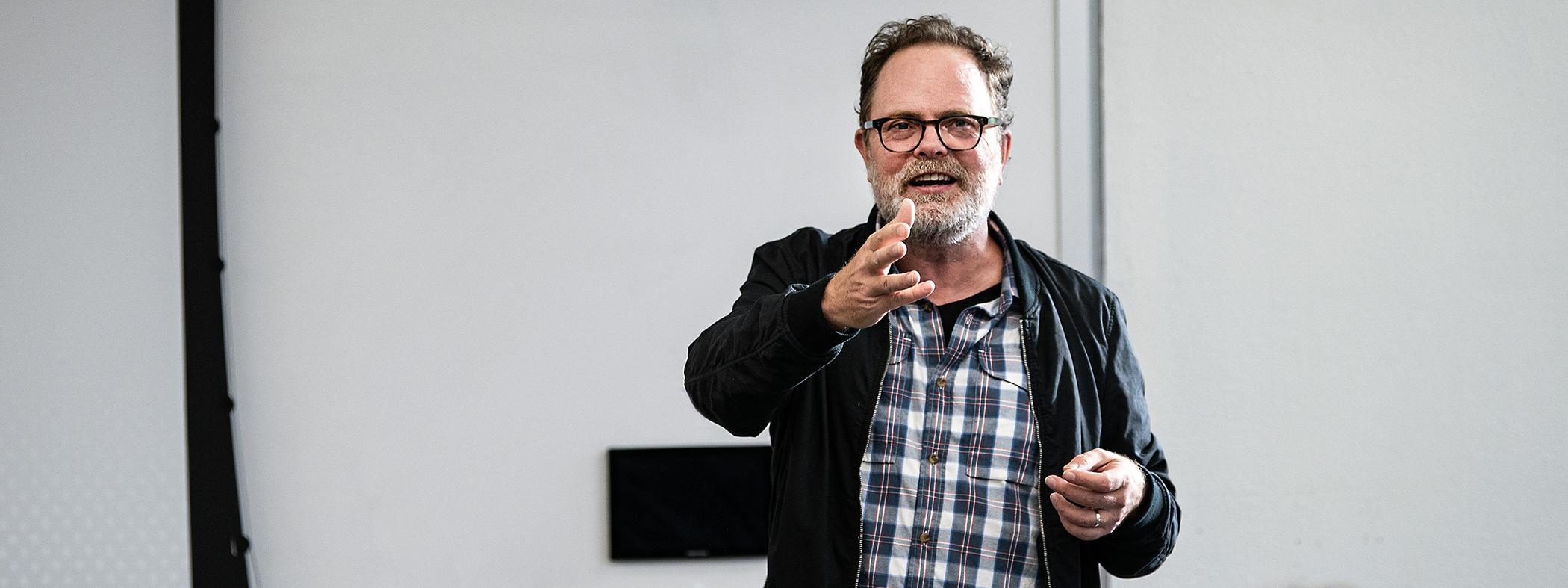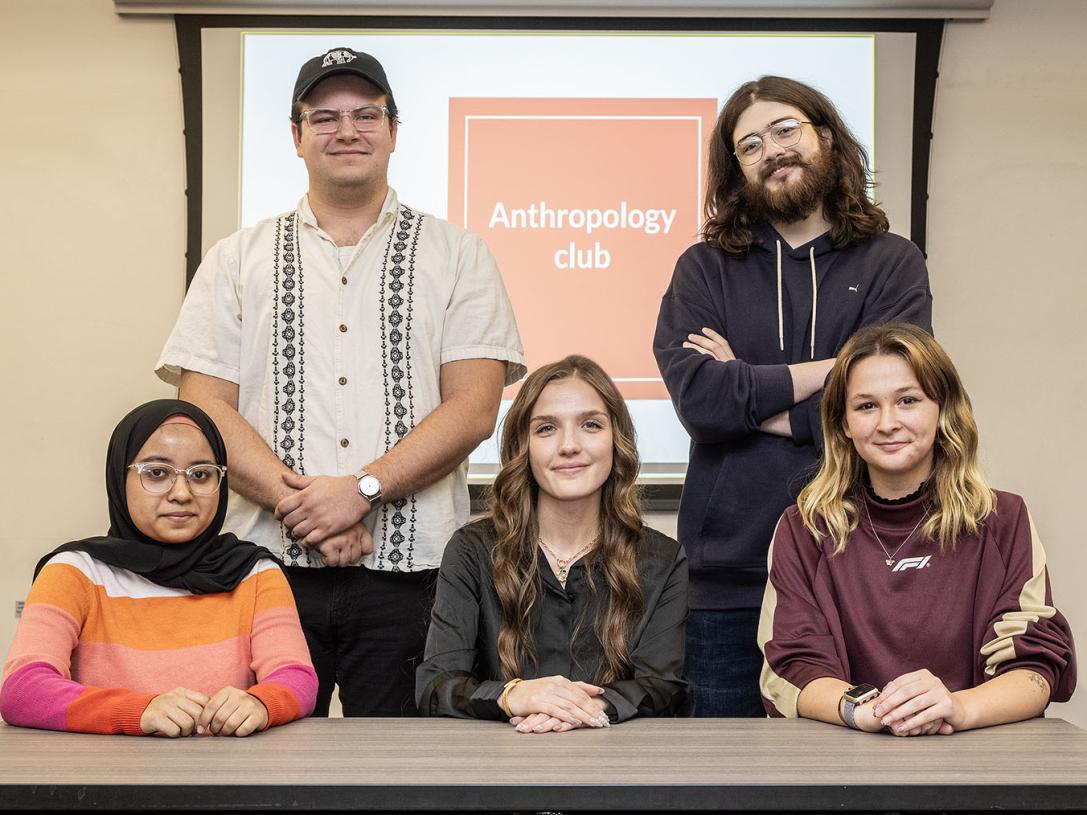
Wilson provides spiritual insight to open Omnibus series
By Blake Sebring
September 22, 2023
Playing characters on critically acclaimed television shows may have proven Rainn Wilson’s acting range, but the depth of the man behind the makeup is incredibly more interesting. Wilson opened the 28th season of Purdue University Fort Wayne’s Omnibus Speaker Series on Thursday night in front of a full house at Auer Performance Hall on the PFW campus.
Speaking about overcoming his mental health struggles, Wilson encouraged the 1,500 in attendance to continue striving for inner peace to fight off the malaise and cynicism of the times. Don’t let them turn you off so much that you quit trying, he said. Look inward to find the spirit of fulfillment because craving more accomplishments, adulation, and acquisitions will ultimately not provide fulfillment.
Wilson was infinitely more engaging, affable, and thoughtful than his signature character Dwight Schrute from “The Office,” who “wrote” an introductory letter for the actor that was read for the highly amused audience.
“Greetings, Hoosier weirdos,” the note began. “First of all, do not listen to a single word that is being said by the idiot that is currently in front of you reading this letter. This actor, while bearing some resemblance to me, Dwight Kurt Schrute, is an imposter—as well as an idiot.
“I think very little of Rainn Wilson, and you should, too. The Hollywood elite, oat milk latte-sipping, electric car-driving artist doesn’t even own a gun, or a tractor, or any tillable land.”
On tour promoting his book, “Soul Boom: Why We Need a Spiritual Revolution,” Wilson recalled how he was unable early in his career to understand or beat his depression, addiction, and crippling anxiety, even though he’d achieved acting success and found love. He gained solace by consuming religious texts, but spoke to the loss of influence from traditional religions while also pointing out the need and usefulness of some of their teachings.
“The main thesis of the book is this idea that because people, especially on the coasts, have rejected religion so much, they have also rejected a lot of the spirituality, and spiritual tools and spiritual ideas that can help us,” Wilson described to a classroom of 50 PFW students a couple hours before the main show. “This is why these ideas have been propagated for the last 3,000 years of human history. They are there to help us, to give us solace, to give us purpose, and meaning and serenity.”
These spiritual tools, Wilson said, are divinely sent through the great religious teachers throughout history. Collectively, humanity has this storehouse of faith-based wisdom that is in all of these different books and traditions from around the world.
Wilson said his favorite quote is from Pierre Teilhard de Chardin, “We are not human beings having a spiritual experience, but spiritual beings having a human experience.”
While questioning the current focus of some religious institutions, Wilson also stressed the need to follow the basic tenets of theological beginnings, pointing out how Christianity in its first few centuries was about serving others, even though the believers often had little themselves.
As with anyone who writes or discusses theological issues, especially a Hollywood actor, Wilson has been dissected and criticized for his opinions; but, as he said, he’s simply trying to help people better understand themselves.
“I’m not any kind of guru or wiser than anyone else,” Wilson told the evening audience. “I suffered a lot. I needed the spiritual tools that I uncovered and connected with. I needed them to stay alive.
“The other aspect of spirituality that I think contemporary American culture has lost track of is the idea that spirituality can help transform humanity as well. There’s kind of a misconception in much of America that spirituality is almost consumerist. `I’m going to ingest some spirituality to make me feel better.’”
But a spiritual togetherness can help all of humanity, Wilson said. One of the problems is that we are divided politically by national parties that are only interested in power and the hundreds of millions of dollars that come every election cycle. He calls America an adversarial society.
Cautioning those gathered not to mistake him for a communist, Wilson drew some of his biggest applause of the evening by saying, “I assure you I think there might just be a better version of capitalism out there that we haven't quite found yet.”
We live in an age where everything is about competition, every man-for-himself, dog-eat-dog, Wilson said, an age all about beating everyone else in the competition of life.
“Those qualities, the worst qualities of humanity, have been baked into our current system, as best evidenced by our partisan political system. It is so grossly toxic and hyper-partisonized that there can’t even be a conversation between two people with different kinds of political ideas.
“It is very easy to look at religions and look at differences between them, and that’s it. What I tried to do in the book is to see the commonalities of religion because I believe there is a divine spiritual inspiration to all of the major world religions, that there is a commonality, a universality of religions that can create a shared set of values.”
Wilson said every major religion includes tenets such as a higher power, life after death, the power of prayer, transcendence, community, a moral compass, a force of love, increased compassion, service to the poor, and a strong sense of purpose.
The Omnibus Speaker Series at Purdue Fort Wayne is made possible in part due to the support of the English-Bonter-Mitchell Foundation, which has sponsored every season since the series launched in 1995.
Theresa Payton, cybersecurity expert and the first female White House chief information officer under President George W. Bush, is the next Omnibus series presenter, coming to campus on Nov. 7 to discuss “How AI/ChatGPT is Shaping the Cyber Landscape.”




